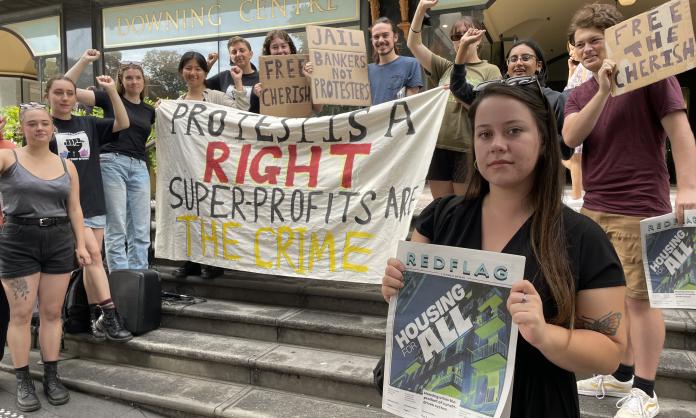Police in New South Wales have admitted that they imposed an onerous bail condition to prevent Cherish Kuehlmann, a student activist who organised a protest outside the Reserve Bank about the housing crisis, from attending further city protests—about anything.
Cherish was arrested at her Sydney home at midnight in mid-February and held in custody overnight. She was charged with “aggravated trespass”, despite never setting foot inside the RBA building in Martin Place. The police imposed a strict bail condition prohibiting Cherish from being anywhere within a two-kilometre radius of the Sydney CBD, which would have lasted until at least October, and likely into 2024, because she is pleading not guilty to the charge.
The bail condition was thrown out at a hearing at the Downing Centre Local Court on 1 March. The magistrate pointed out that any restrictions on Cherish would be “inappropriate” considering the nature of the charge, which carries a maximum penalty of a $5,500 fine. The bail condition was particularly inappropriate considering that it was intended to undermine her democratic right to protest.
The police were supposed to provide Cherish with a document outlining the reasons for the bail condition. They failed to do so. In court, the prosecutor argued that the bail condition should be maintained because Cherish “may engage in similar events”, pointing specifically to a National Union of Students climate protest planned for 3 March. The prosecutor persisted in arguing that Cherish’s right to protest should be curtailed because “she does not respect private property” and that to drop the condition would “permit her to attend rallies”.
Bail conditions have increasingly been used by the police to undermine the right to protest. Climate activists in NSW currently awaiting court hearings have been prevented from associating with dozens of their friends, using encrypted messaging apps, owning more than one phone and entering the city. Those bail conditions could remain for more than a year as the accused wait for lengthy court proceedings to finish.
The police prosecutor also accused Cherish of attending “an unlawful protest”. This is not true. In NSW, there is a process through which activists are encouraged to submit a “Notice of intention to hold a public assembly” (commonly referred to as a Form 1) to the police. This is not a request for permission. If the notice is not submitted, the protest is deemed “unauthorised”, not “unlawful”. Responding to the prosecution, the magistrate noted that there currently is no such charge as attending an unlawful protest.
Restrictions on the democratic right to protest in NSW continue to be tightened. Last year, the Perrottet government passed the Roads and Crimes Legislation Amendment Bill with the support of the ALP. The new laws make it a serious offence to protest on major roads or near major facilities.
Climate activist Violet Coco was last year sentenced to fifteen months in jail, eight without parole, for merely blocking one lane of traffic on Sydney Harbour Bridge for 25 minutes. (She has been released from custody pending an appeal.)
“My arrest is connected to the new laws. I wasn’t charged with them specifically, but now the police in NSW are feeling totally confident to crack down on activists because they’ve been given the go-ahead to do so already by victimising climate activists”, Cherish said outside the Downing Centre on 1 March.
“That’s why they’ve used the trumped-up charge of aggravated trespass ... It’s clearly police intimidation ... They didn’t arrest me in front of my friends, my comrades and the media; they got me alone at my house and held me in a cell for four hours so they could push these outrageous bail conditions on me where I’m not able to participate and politically express myself at protests.”
Cherish will plead not guilty to the charges at her next court hearing on 25 October. In the meantime, she will continue to lead protests in the Sydney CBD.








